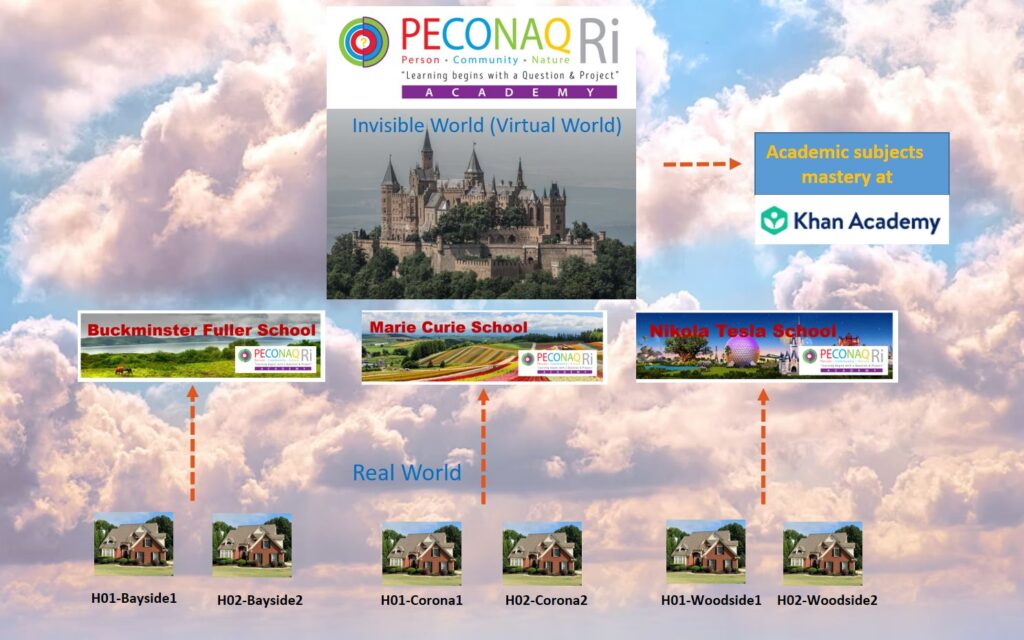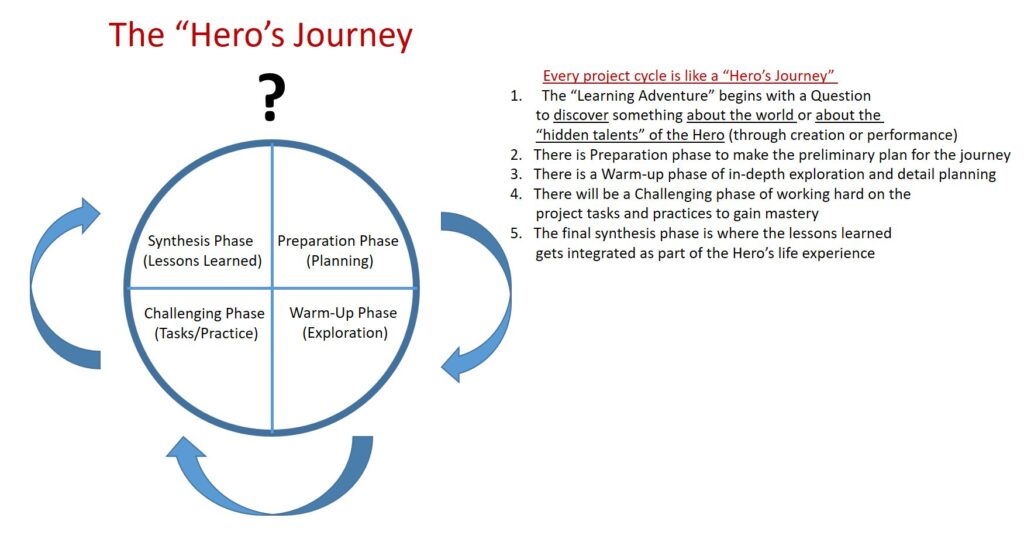Our proposed education model is a personalized, student-centered education system, driven by the curiosity and interests of students. The goal of the education is to help students discover and develop their innate talents via a project-based learning approach, so as to prepare them for their life journey in this world.
There is no need for any homeschooling member of this website to follow our proposed education model.
We have develop the model as a guide for any homeschooling parent/mentor who needs help to start a structured, project-based learning approach to homeschooling using the abundant, excellent teaching and learning resources available from the internet, and the curiosity of their student as the starting point for their learning adventure.

9 Thematic Projects
We use the Peconaq Learning Framework and Map as the basic structure for organizing the training of the students. The students are required to complete 3 different types of projects – (a) discovery, (b) visual arts (creative) and (c) performance arts (creative) projects based on the student’s own questions about their physical body and the world they live in.
The following are the 9 kinds of thematic projects the students have to complete.
- Physical body projects [discovery]
- Visual arts projects [creative]
- Performance arts projects [creative]
- Social science projects [discovery and creative]
- Technological science projects [discovery and creative]
- Mathematical science projects [discovery]
- Natural science (plants) projects [discovery]
- Natural science (animals) projects [discovery]
- Natural science (environment) projects [discovery]

3 Project Types
The difference between the 3 different project types are as follows.
(a) Visual (Creative) projects – This type of creative projects require the students to create something with their innate creative abilities, as a form of self expression of their internal visual imagination of the things they wish to make into a reality in the physical world. For example, painting, writing a story, building something, etc. and are normally done with their hands.
(b) Performance (Creative) projects – This type of creative projects require the students to perform using their body’s innate abilities, as a form of self expression of what they want to make their body perform in the physical world. For example, singing, dancing, swimming, etc.
(c) Discovery projects – This type of projects require the students to discover nature’s designs of their physical body, the natural systems of plants, animals and the physical environment, and also the social and technological systems created by human beings. The method they use to do their discovery projects is the scientific method.

The “PeconaqRi Academy Game”
In order to make the student’s educational experience FUN the mentor can treat the whole educational experience as a GAME where their students are considered as a “hero-in-training”. As a “hero-in-training” they have a responsibility to “know their INVISIBLE (i) inner selves and talents” and also the external REAL (R) world environment in which they live.
Each of them has a “Personal Legend” to fulfil in their life journey in this world and their education should be driven by their own questions to understand both their invisible inner being and the external world environment.
Thus, their training will involve completing multiple thematic, self and external world discovery projects, that they develop and complete under the guidance of their guardian mentor.

The “Hero’s Journey” – The 4 Project Phases
Joseph Campbell in his study of myths from all over the world discovered that there is a common template of stories that involves a hero who goes on an adventure, is victorious in a decisive crisis, and comes home changed or transformed. He call this monomyth – “The Hero’s Journey”.
Each student training as a Hero has to be prepared to go through multiple rounds of a Hero’s Journey. Each study project that a student do can be considered a “Hero’s journey” and can be divided into the following 4 phases, as illustrated in the diagram below.
(a) Preparation phase (Planning)
(b) Warm up phase (Exploration)
(c) Challenging phase (Tasks/Practice)
(d) Synthesis phase (Lessons learned)
The preparation phase is initiated from the question that the student wish to seek answers in one of the 9 project themes. This phase will require the students to do some preliminary research and discussion with the mentor to define the topic to be studied. The output from Phase-1 will be a list of resources (videos, articles, etc.) and exercises that the students need to complete in Phase-2 to get an in-depth understanding of the subject matters related to the project that they have to complete.
In Phase-2 the students completes the exploration of all the project resources identified in Phase-1, including new ones that they discovered, and will be able to decide which aspects of the project that they wish to study in detail. They will then develop the project design and list of tasks to be completed in Phase-3.
In Phase-3 the students go through the challenging phase of doing their projects by completing the project tasks and encountering the difficulties that they need to overcome to complete their project.
In Phase-4 the students will review the results and the experience they gained by synthesizing them as lessons they have learned as part of their growth as a Hero. They have to prepare a written project report and may make a presentation to their peers before they get an award for completing the project.

Mastery of Academic Subjects
The students in the PeconaqRi Academy community get guidance and encouragement from their guardian mentors in deciding and designing the projects that they have to complete as part of their hero-in-training assignments. If desired, their growth as a Hero may also be monitored and track through a series of awards that are given upon completion of each project, and at the end of each academic quarter.
To get mastery of academic subjects it is recommended that students sign-up for an account at the Khan Academy. At the Khan Academy students can gain mastery of the academic subjects related to their projects. The Khan Academy can be considered like a “boot camp” for the students before they get ready to enter the challenging Phase-3.
The students mentor will decide in consultation with the students what the students need to complete at the Khan Academy, as part of the resources that the students need to explore in-depth in Phase-2.
In this way, the project allows the students to acquire mastery of the academic subjects within the context of designing and completing a project that they are interested in. This will make the academic subjects that they study relevant to them and will help them get an in-depth appreciation of the subjects matter covered.
Since Khan Academy’s courses are also bench-marked to the Common Core Standards this will also allow the student mentor to track the students competency in meeting or exceeding the standards for their age-grade level.

© 2025 Jin Lee. Peconaqri™, Peconaqri Academy™, and Peconaqri Game of Life™ are trademarks of Peconaq Inc. in the United States and Jin Lee in Malaysia. All rights reserved.
